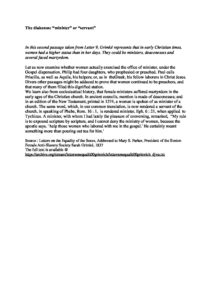In this second passage taken from Letter 9, Grimké represents that in early Christian times, women had a higher status than in her days. They could be ministers, deaconesses and several faced martyrdom.
Let us now examine whether women actually exercised the office of minister, under the Gospel dispensation. Philip had four daughters, who prophesied or preached. Paul calls Priscilla, as well as Aquila, his helpers; or, as in theGreek, his fellow laborers in Christ Jesus. Divers other passages might be adduced to prove that women continued to be preachers, and that many of them filled this dignified station.
We learn also from ecclesiastical history, that female ministers suffered martyrdom in the early ages of the Christian church. In ancient councils, mention is made of deaconesses; and in an edition of the New Testament, printed in 1574, a woman is spoken of as minister of a church. The same word, which, in our common translation, is now rendered a servant of the church, in speaking of Phebe, Rom. 16 : 1, is rendered minister, Eph. 6 : 21, when applied to Tychicus. A minister, with whom I had lately the pleasure of conversing, remarked, “My rule is to expound scripture by scripture, and I cannot deny the ministry of women, because the apostle says, ‘ help those women who labored with me in the gospel.’ He certainly meant something more than pouring out tea for him.’
